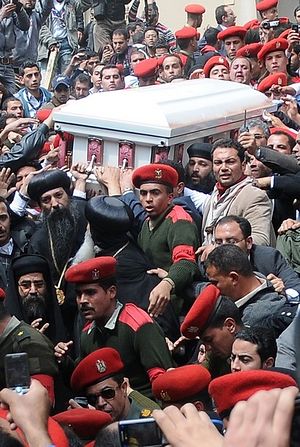Cairo, 21 march 2012
 Egyptian soldiers carry the coffin of Pope Shenouda III, the head of Egypt's Coptic Orthodox Church, during his funeral in the Abassiya Cathedral in Cairo March 20, 2012.
Egyptian soldiers carry the coffin of Pope Shenouda III, the head of Egypt's Coptic Orthodox Church, during his funeral in the Abassiya Cathedral in Cairo March 20, 2012.
Mourners attempted to enter the cathedral grounds as prayers started at 10am, to pay their respects to the spiritual leader whose body lay in an open casket. However, many were prevented from entering the cathedral grounds, which have been shut since the early hours of Tuesday morning following an announcement by the heads of the Coptic Church that the funeral would be invite-only.
Thousands of key politicians, national and international religious leaders and public figures attended.
Members of the ruling Supreme Council of the Armed Forces (SCAF) were present together with Prime Minister Kamal El-Ganzouri and his predecessor Essam Sharaf.
Parliamentary figures such as the People's Assembly speaker Mohamed Saad El-Katatni attended, together with Islamic scholars from Al-Azhar and Islamic preacher Amr Khaled.
Presidential hopefuls Amr Moussa, Ahmed Shafiq (a former prime minister), Khalid Ali, Abdel-Monem Abul-Foutoh and Judge Hisham El-Bastawisi were also in the congregation.
International figures around the world who did not attend the funeral offered personal messages of condolence to the community, including the Vatican, the Al-Quds Al-Sherif and President Obama.
Guests, including the Patriarch of the Ethiopian Orthodox Church and the head of the Syrian Orthodox Church delegation, were invited to lead the initial prayers before Egyptian Bishop Pakhomious of Beheira, who is acting as a temporary patriarch, took over proceedings.
Later, a letter written by the late pope for his funeral was read by the Bishop Pefnotios of Samalot. "I am your father," it read. "Preserve peace and keep in touch with your loved ones, instigate good deeds and do not let yourselves stray from your way."
For the general public, large screens were erected in the cathedral courtyard. Many had travelled for hours and slept in the grounds to come to the funeral. Priests coming from the southern city of Sohag told Ahram Online that they have arrived on Monday afternoon and had only had an hour's sleep. One man, who had travelled from Assiut, had been trying to get into the cathedral for two days in order to see the pope.
Even those with invitations found it hard to get inside, as the church closed its doors a full hour earlier than expected.
"We are coming from Fayoum, have been traveling for three hours and got an invitation. Why are we denied entry?" asked Fayza Mouris, 63, who was in tears, praying, "Please Pope Shenouda, let me inside."
Desperate attempts were made to enter the grounds, with some climbing ladders to watch from the windows of the church. Others scaled trees and jumped over the 12 ft church walls. "I need to get his blessings before he departs," Sadiq Sharaf, 55, from Sharqiya told Ahram Online as he tried to make his entry.
Men, women and children cried as they held pictures of the deceased pope.
In later years, following what appeared to be a change of heart in exile, Shenouda has been criticised for cooperating with Mubarak's regime and then with the ruling SCAF. However, following the massacre of 27 mostly Coptic protesters outside of the Maspero state TV building on 9 October 2011, Shenouda pronounced the dead to be martyrs, stating, “These martyrs are our beloved children and their blood does not come cheap.”
For the Coptic mourners outside of the cathedral, he was a father-figure who was also an essential protector and representative of the marginal Christian community. With a largely Islamist parliament currently in power, many expressed their fear for the future of the minority group now that he had passed away.
"We don't know what the situation will be for us Copts. We have to see who the new president is and what is written in the constitution. If we have a Salafist or a Muslim Brotherhood president this could be a disaster, as they will judge and control the country based on Muslim principles and may disregard us and our needs," explained Ashraf Shukrallah, 38, an engineer from Cairo.
"We are devastated. For 40 years the pope strove to do right thing in Egypt for the Coptic community," added Samra, 65, a Coptic resident of Shubra. "After situations like Maspero, he knew how to deal with it; he knew how to mediate between Muslims and Christians." As she spoke the crowds had began singing Coptic hymns and reciting prayers.
At 1pm the casket was carried out of monastery in a heavily-guarded white ambulance. Fights broke out between mourners and the security forces as people rushed to get a last look.
Thousands pushed through the seven-man-deep lines of police and ran after the vehicle, weeping and crying, "We love you, father."
The casket was flown by military helicopter to St Bishoy Monastery in the Wadi Al-Natroun region, where the patriarch was due to be buried.
On arrival at the desert monastery at 5:30pm, thousands massed around the motorcade carrying the deceased pope's body. In the ensuing scrum, it took the military police over half an hour to get the ambulance to the monastery door. The deacons and altar boys accompanying the vehicle desperately tried to guard it and fight off the press of mourners.
Nevertheless, the late pope was successfully laid to rest, in the very monastery where he spent his exile. People continue to queue outside to kiss his tomb.
"It's a very terrible day. He touched not only people in Egypt but people all the over world," Abraham, a Coptic priest from Ain Shams told Ahram Online back in Cairo, where people were processing around the cathedral following the departure of the casket.
"'He was like a father to us. He lives with us and we live with him."
Source: Ahram Online
